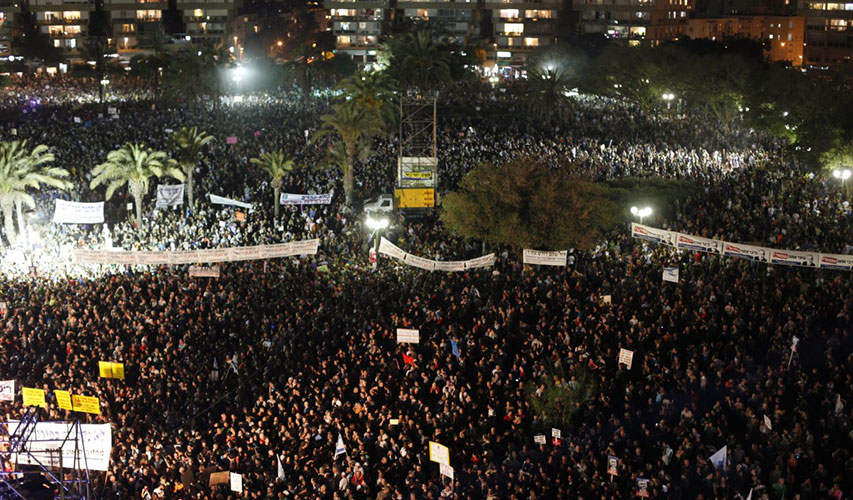Haaretz and the New Israel Fund focused their joint New York conference on three interrelated topics: peace, democracy and social justice. Though the relation between the three is obvious, a lot still had to happen to tie them together.
Still, despite the innovative title, the conference’s structure reflected the long tradition of the American Jewish progressive camp and the Israeli Left. Only one panel was devoted to the question of socio-economics. All the others focused on peace and the occupation.
This is a profound mistake and the Israeli society has been paying a hefty price for it for. A political map where the only difference between the Right and the Left revolves around the occupation and peace promises a continuous political deadlock. For years the two camps have been yelling at each other from across the road while and the convoy of the wealthy passes by, the settlements flourish undisturbed, and the impoverished masses watch the spectacle with panicked eyes. They will always join those who speak the language of fear as long as this goes on.
For decades, I was part of this mistake. I became a political activist during the first Lebanon War. True, we included the slogan “Money for development towns and not for settlements” in our demonstrations. But this was the extent of our social analysis. Occasionally someone would suggest organizing a conference on women, Mizrahi, or the poor, but the occupation was always more urgent. And we truly believed that the occupation was the origin of all issues. We had to first stop the flow of money to the settlements, and then the money would naturally go where it was needed.
Let’s be honest: we haven’t gotten very far. Not in the eighties. Not in the nineties. And most definitely not since the turn of the millennium. Another war in Lebanon, two intifadas and a host of well-branded military operations have passed us by. There is no peace now and it’s not on the horizon. Since Ariel Sharon’s brilliant disengagement from Gaza, we don’t even engage in diplomatic negotiations. In the meantime, two generations of leftwing activists have put everything they’ve had into ending the occupation, yet most Israelis think the Left is only concerned with the welfare of the Arabs.
The 2011 social protests shattered this deadlock. In a rare moment, people realized that these definitions of left and right, focused on different configurations of the future, divert people’s gaze from what is happening here and now. Citizens from all sectors of society understood that the system ruins them all. They came up with a common cry “The people demand social justice.”
When I went to Rothschild Boulevard in Tel Aviv with my partner Daniel Dor that summer, we felt extremely uncomfortable. On the one hand, there was an unprecedented burst of innovative civic energy. People were asking the most subversive questions about the power structures of our society. On the other hand, all these good people had made a decision not to focus on the occupation. We thought about it and realized that anyone who wants to promote change has to work within a given reality. Israeli society suffers from profound ills. Some ills are most certainly the result of the ongoing occupation. Indeed, the occupation has corrupted Israeli society. But anyone who wants to see an enlightened society in this country must first and foremost help make the reality Israelis live in less dire.
The social protest showed us the strength in numbers: the number of people taking to the streets; the budget’s numbers suddenly became our favorite reading material. The new civil power was based on a new kind of knowledge: who is financing whom, who is connected to whom, and who pays the price. We chose to turn the spotlight on the legislative system. In Fall 2011, we established the Social Guard to monitor the work of Knesset members. Hundreds of Social Guard activists regularly come to the Knesset to make sure our representatives start to truly represent the public interest and not succumb to the pressures of capital and the government. A variety of civil society groups were formed alongside the Social Guard to focus on changing the balance of power between the people and the government.
Thus, a new and more complex political map has been created. A map unwilling to accept the old rigid division between right and left. One doesn’t have to be a leftist to aspire that every child in Israel will drink clean water and have enough to eat. One doesn’t have to be on the right to believe that free market competition is better than cartels. People on the Left and the Right understand that transparency is the key to public power and that democracy requires public power. People on the Left and on the Right understand that without a democracy we cannot care for the welfare of Israelis.
We haven’t given up on resolving the conflict and ending to occupation. But beyond the critical monitoring activities of organizations such as the “B’tselem,” “Breaking the Silence” and “Machsom Watch,” resolving the conflict and ending the occupation currently isn’t a practical goal for civic activism. They are as urgent as ever, but we don’t have the tools to advance these goals, and dealing with them paralyzes any attempt to change the political map. Such a change requires time and waiting is difficult. To say, if we don’t wait the deadlock will continue.
The text was published in December 2015 in Guy Rolnik’s blog and translated by Maya Haber.







Please be more specific in your discussion of what must be done. thx.